Festivals
Berlinale 2012:
The Sight & Sound blog
Greek to me: mafia Shakespeareans win the Golden Bear
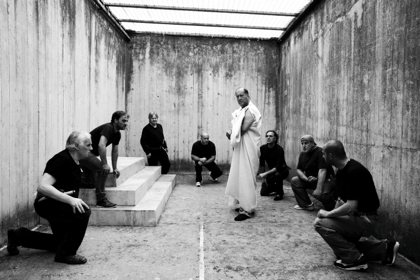
Caesar Must Die
Nick James, 19 February
To see the stimulating delights of Tabu (about which I’ve already posted in detail) win the Golden Bear would have made me almost as happy as its cadre of more swoony critic supporters. Instead its director Miguel Gomes had to make do with the Alfred Bauer prize for innovation. But that doesn’t mean I consider the Taviani Brothers’ victory with Caesar Must Die a disappointment. This too is an innovative film, a drama-documentary about prisoners staging Shakespeare’s Julius Caesar that’s so clever in the way it slips from play rehearsal into real squabbles, and absorbs the psychogeography of prison into its miss en scène, that its self-reflexivity feels seamless.
The way some of these incarcerated mafia hoods approach their characters and lines can be hammy, but the sharp emotion of conflict and betrayal fires their eyes and gestures naturally, and some of them – notably Giovanni Arcuri as Julius Caesar – are fine actors indeed. Given the double filter of hearing them speak in Italian (of which I understand little beyond basics) and reading subtitles that don’t always seem taken directly from the Shakespeare text, it’s all the more impressive how vividly the play comes across when performed by these harsh-faced, muscle-bound street thugs. I found it much more interesting, for instance – though many would disagree – than Ralph Fiennes’s Coriolanus, which he brought to Berlin last year.
Estimable too is Christian Petzold’s Barbara, which won him the Best Director prize. In a backwater town in 1960s Communist East Germany, Barbara (Nina Hoss), a recalcitrant woman doctor, arrives from Berlin to work at the local clinic. André (Ronald Zehrfeld), the head doctor, is instantly attracted, though the rest of the staff think her standoffish, and indeed he too is rebuffed and accused of spying on her for the authorities.
It transpires that Barbara, a woman of formidable self-possession, has probably only committed the crime of asking for an exit visa for the West, though she seems quite the pro at hiding things from the Stasi, and adept at making rendezvous with her West German lover. A warmer film from Petzold than the chilly likes of Wolfsburg, Yella and Jerichow, Barbara remains impressive throughout, even if the script labours through its final third in which our heroine – played with utter brilliance Hoss, a Petzold regular – has to choose between moral and romantic commitments.
Overall Berlin reduced itself down to the five or six films that mattered – and that five or six differed depended on what you could see in what remains an over-stocked programme.
Among those that sadly didn’t matter, I’d have to include Brillante Mendoza’s lazy Captives – which didn’t seem to know what to do with its kidnapped-group-in-the-jungle idea, let alone Isabelle Huppert in the lead role of a captured Christian missionary – and Guy Maddin’s Keyhole, which seemed as if the maverick Canadian genius had too much brewing in the conceptual pot of staying within a single house that’s both gangster refuge and mansion of Oedipal ghosts.
There’s much more to be said about this year’s Berlinale, but for my final report, look out for the forthcoming April issue of Sight & Sound.
O masterpiece, where art thou?
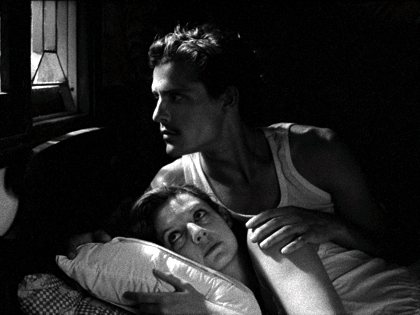
Tabu
Geoff Andrew, 18 February
Between a couple of Berlin’s press screenings, Nick James and I found ourselves discussing the overuse of ‘masterpiece’, a word apparently as vulnerable to abuse as ‘classic’ (though not, mercifully, as oxymoronic as ‘instant classic’). Apart from noting that the situation may have deteriorated because journos are expected to tweet the moment a premiere’s reached its end, there’s no need here to trawl through the semantic issues involved. Still, the very notion of what constitutes a ‘masterpiece’ seems relevant to how industry folk approach festivals generally. For amid all the constant discourse as to whether this year’s Berlinale is strong, weak or merely par for the course, one often hears someone – and I confess it could be me – uttering the phrase, “Well, there haven’t been any masterpieces, but…”
Which raises the question of whether it’s reasonable to expect such films to appear at festivals with any regularity when even A-list events come up short on that front. I myself have argued for Cannes’ overall superiority by saying that one’s more likely to find one there than elsewhere. That’s clearly a flawed premise – such films, after all, should be rare. Let us also remember that if we call a film a masterpiece, it should be, if not perfect, then as near as dammit. In Berlin, some have claimed that Miguel Gomes’s Tabu is a masterpiece, just as others have harked back nostalgically to last year’s edition which, it’s alleged, produced two masterpieces in A Separation and The Turin Horse.
Now, impressive as all these movies are, I consider none of them deserving of the M-word. Each is clearly flawed in one way or another; and if the film with the most persuasive claim to greatness is the one by Béla Tarr, I’m afraid even that must surely yield to the Hungarian maestro’s Sátántangó, which remains a truly monumental and extraordinary achievement. The accent should be on that ‘extraordinary’. A masterpiece can’t just be a terrific movie; it has to be far more than that. It is by definition the greatest work (or at the very least one of the greatest works) of a proven master; it is also a ‘consummate piece of work’. That surely suggests, among other things, immense depth, richness and resonance – a real sense of completeness. A Separation was beautifully written and performed, but I for one felt that some of those other requirements for a masterpiece were unfulfilled; likewise, some of the more portentous moments of The Turin Horse (the finger-lickin’ scenes with those wretched spuds, for instance) seemed to verge on self-parody. As for Tabu… besides everything else, is Gomes already a proven master?
So this year’s Berlin? Not a single masterpiece, as far as I’m aware. But terrific films? Yes, about nine or ten that I’ve caught so far. (The best, for me, is still probably Radu Jude’s Everyone In Our Family, a taut, telling, superbly constructed and performed account of a couple’s post-marital tensions leading almost inexorably to barely controllable violence.) That’s not a superabundance by any means, but for me it’s enough to be going on with.
Building unease: Bence Fliegauf’s Just the Wind (without subtitles)
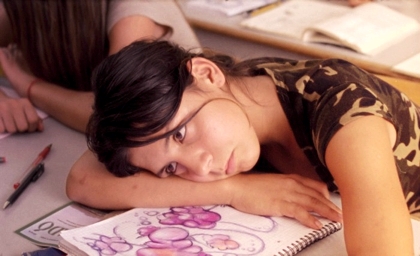
Just the Wind
Jonathan Romney, 17 February
Was Berlin good this year? I really couldn’t tell you – with a festival this sprawling, it’s hard to get a proper grasp of things, and while people kept telling me that I’d missed some great films, I seem to have drawn a veritable quiver of short straws among the selection. And then, as luck would have it, my bad timing nobbled me in exactly the way it did in 2011. Just like last year, I checked out of my hotel and dropped my bag off at the Hyatt cloakroom just in time to meet a stream of wild-eyed people telling me that this morning’s competition film, Kim Nguyen’s African-set war drama Rebelle (War Witch), was the absolute revelation of the Berlinale. You’ll no doubt be reading more about it here, and I can’t wait to see it. (Mind you, I can’t even remember what film it was that I missed for the same reason last year: these things never feel as important once a festival is over.)
Just like last year, too, I managed to grab a ticket for a public screening of a competition film, completely forgetting that I’d be getting German subtitles only. It happened with A Separation last year, and I can assure you my German’s not much better than my Farsi. This time, the film is question was Just the Wind (Csak a szél), the latest from Hungarian director Bence (more usually known as Benedek) Fliegauf. I didn’t rate his last film Womb – a weirdly airless story of love and cloning starring Eva Green and Matt (Doctor Who) Smith – so I wasn’t expecting much from Just the Wind. And, although there’s not a huge amount of dialogue, there was enough for me to know that I was missing some important nuances at least. So I won’t presume to deliver a judgment here, except to say that I’m intrigued enough – if not positively gagging – to see the film again.
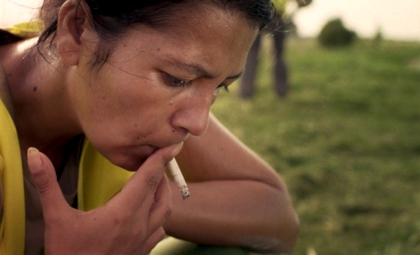
This extremely sombre drama is a response to a recent outbreak of murders of Gypsy families in Hungary, and takes us through a day in the life of one family, from morning to night, with the impending horror held artfully in suspense throughout. Fliegauf follows the trio of Mari, the mother, through her working day as a cleaner, her young daughter Anna to school, and older brother Rio through his hours playing truant, exploring the local countryside and swimming with friends. Throughout a seemingly free-form succession of parallel events, there are various manifestations of menace (a group of drunken men try to waylay Mari) and portents of death (in a striking act of respect, Rio takes time out to bury the body of a pig found in the woods).
Visually, I felt that we were in slightly familiar terrain – Zoltan Lovasi’s photography is in a register of lyrical realism, making great use of glaring sunlight, but I couldn’t help thinking of Peter Strickland’s ruralism in Katalin Varga (possibly because of the Hungarian setting) and, even more, of the Dardenne brothers, with the camera hanging close on characters’ shoulders. All in all, I wished Fliegauf had relied more on implying rather than showing the catastrophe at the end, and the grim coda seemed a misjudged overstatement. For me, it was the build-up of unease that made the film really special, with the sound design (I’m assuming it’s the work of Tamas Beke, credited in the press notes as ‘sound master’), sometimes using the almost subliminal tremor of a string instrument to create tension. But I’ll withhold judgment till I see it again and get a handle on the dialogue.
I’m shipping out now but, for the record, my competition highlights were Miguel Gomes’s inspired, eccentric Tabu (which also featured Berlin’s best animal, in the form of “a sad and melancholic crocodile”) and Christian Petzold’s Barbara, with its superb lead Nina Hoss (whose East German medic in rural exile was pretty sad and melancholic herself).
And my competition low point: Edwin’s Postcards from the Zoo, an Indonesian film which made me think that the influence of Apichatpong Weerasethakul’s reveries hasn’t been entirely beneficial. And if I were on the board of Djakarta Zoo, I’d be wanting to know whose bright idea it was to let Edwin make such a lamentable anti-advert for the place.
Silver valentine: Miguel Gomes’s audacious movie medley Tabu
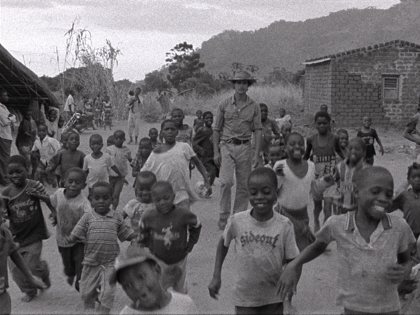
Nick James, 15 February
I’ve liked a few films here so far at the Berlinale – the Taviani Brothers’ Caesar Must Die, Christian Petzold’s Barbara, Axel Petersén’s Avalon and even Billy Bob Thornton’s Jayne Mansfield’s Car, for instance – but I’m posting today about just one. Some films grow in the mind and I have been thinking off and on about Miguel Gomes’s Tabu.
That it’s the most audacious and intricate film to be seen so far in Berlin’s competition is without question, and to some extent it’s fulfilled the same role here as did Malick’s The Tree of Life in Cannes last year. I don’t mean that this monochrome valentine to melancholy (it screened on 14 Feb) was quite the media sensation that Malick’s film was, but rather that former critic Gomes was already set up to be cinephilia’s Next Big Thing – the subtle surprises of Our Beloved Month of August made sure of that. But the first coup of Tabu is that it’s not much like that curiously beguiling summer film in either approach or content, and the fact that it bears the same title (and, I’m told, chapter headings) as the FW Murnau and Robert Flaherty classic [full title: Tabu A Story of the South Seas] is a much stronger indication of the kind of film it is.
Tabu begins with a prologue of considerable dry wit about a 19th century explorer in Africa who is so hounded by the ghost of the woman he abandoned that he sacrifices himself to a crocodile. The woman and the now “sad and melancholic” crocodile thereafter haunt the savannah together. This section also establishes a flat-on, cod-ethnographic, silent-era mode of representation with voiceover; later the film plays out another variation on the silent style, which becomes the dominant mode of storytelling (and makes Tabu a kind of antidote to The Artist). It evinces a similar fascination with vintage filmmaking techniques to that found in Apichatpong Weerasethakul’s Uncle Boonmee Who Can Remember His Past Lives… but it also has the delicate picture-book flavour that gives so many of Manoel Oliveira’s fables their own deliciousness.
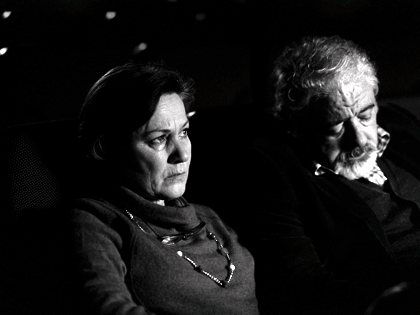
After the prologue, the film puts us in present-day Lisbon, and into a mild diary-led drama (with conventional sound dialogue) centred on Pilar (Teresa Madruga), an elderly woman worried about her disturbed neighbour Aurora (Laura Soveral), who gambles her money away and complains that she is kept prisoner by Santa (Isabel Cardoso), the live-in Cap Verdean carer/housekeeper paid for by Aurora’s daughter (the latter a structuring absence). A teasing, gentle vein of self-mockery here combines with an oblique approach to editing and narrative to enliven what might otherwise be rather domestic exposition – including one fantastic movie-date scene with Pilar and her artist suitor that superbly contrasts much of what’s to come. Indeed, one problem for this film is that its pleasures are so much to do with the ingenious ways it draws you into its fatal attraction that to write about it at length is to ruin some of that enjoyment.
I shall therefore try not to spoil too much more. Where we eventually end up after much sleight-of-hand is in a Hemingwayesque yarn of adultery in Africa some 50 years ago, shot in the DW Griffith tradition and acted without audible dialogue by a suitably comely pair, she (Ana Moreira) a lynx-eyed vamp and he (Carloto Cotta) an Errol Flynn lookalike. Comedy relief comes from a subplot about our hero being in a band that plays Phil Spector songs.
What stops this formally enticing film from achieving some kind of transcendence is that its emotional heart is in the wry present-day material and in the richly romantic letters that inform the framing voice-over narrative. The last and most melodramatic quarter of the film plays out with the dwindling effect that eventually besets all pastiche, and overall the tone of the film remains a little pleased with itself. Yet there’s much that resonates here beyond filmic exercise. This year’s Berlin selection would have been routine indeed without it.
Time for outrage: Tony Gatlif’s Indignados
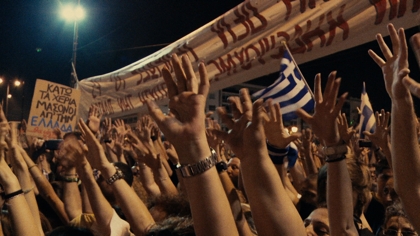
Demetrios Matheou, 15 February
I was very sad to hear of the violence in Athens this week, in particular the burning of the wonderful pair of city-centre cinemas, the Attikon and Apollon. Built in 1912, these are an integral part of the Athens International Film Festival, and I’ve spent many balmy evenings on the streets outside, chatting and smoking with the enthusiastic Greek audiences. The word is that the cinemas can be saved, but it’s a sorry state of affairs when louts can use the economic crisis as an excuse to destroy their own culture.
The events in Athens made me think immediately of one of the most apposite films here in Berlin, Tony Gatlif’s Indignados, which represents a more powerful and creative way to vent one’s anger.
Described as a “dramatised account of a Europe in revolt”, the film looks specifically at two things: the appalling experiences of undocumented immigrants, and the continent-wide demonstrations against the economic crisis. Gatlif derives his title from Spain’s Indignados (Outrage) protest movement, and his inspiration from the pamphlet ‘Indignez-vous!’ (‘Time for Outrage’) by the former Resistance fighter, diplomat and writer Stéphane Hessel.
The film occupies that ever-murky, ever-engaging grey zone between documentary and fiction. In its foreground is the story of ‘Betty’, a young, undocumented immigrant from Africa, who mysteriously swims ashore in Greece and is buffeted from one country to another, unwanted, her only trace on the continent the fingerprints taken by police wherever she goes. Betty’s story is clearly orchestrated; around her Gatlif combines conventional documentary coverage of the mass demonstrations in Athens and Madrid with beautifully shot and imagined sequences that add resonance to his theme.
In one, which draws on the visual tools of the Indignados protesters, a flamenco dancer performs in the heart of a deserted, graffiti-covered concrete complex while showered by a confetti of leaflets. Elsewhere, hundreds of oranges cascade downhill through rain-soaked African streets, the spring of their passage evoking the desire for freedom and expression of anyone from the participants of the Arab Spring to those escaping Africa for a supposedly better life elsewhere.
Gatlif’s use of quotations (from Hessel) and other text onscreen evokes Jean-Luc Godard’s didactic devices; but whereas the old provocateur generally gives the impression that he’s beating only to his own drum, Gatlif’s film has a communal sensibility and a warm pulse. One dramatic embellishment of his documentary image is heartbreaking: as the camera surveys an array of empty mattresses and cardboard boxes on the streets of Paris, captions inform us of the names, ages and places of origin of those who sleep upon them.
Betty’s story sometimes feels forced, but overall this is an engrossing account of the state we’re in, connecting the ‘undesirable’ newcomers to Europe with those – as in Athens – who have a passport, citizenship, who pay their taxes, but are no more loved.
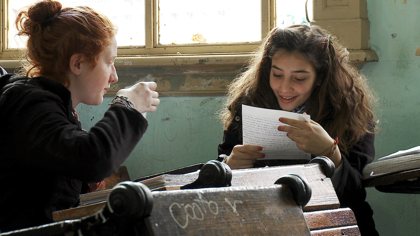
Elsewhere on the documentary front, I enjoyed Celina Murga’s Escuela normal (above), which follows the day-to-day chaos of a provincial school, buckling under the weight of too few teachers and resources, and far more kids than the building can bear. Like the Argentine’s feature work (Ana and the Others and A Week Alone), this has no exposition. We’re trusted to follow the camera and make our own assessments of what it finds in classrooms, staff rooms, hallways teeming with life and the heated hustings for student council elections; and that is a microcosm of the country itself.
By contrast, Kevin Macdonald’s account of the life and times of Bob Marley, Marley, had far too many talking heads, fighting for room on a narrow hagiographic path, and the more they talked the more their subject receded into the dark. From such an imaginative documentary-maker, this was a huge disappointment.
Two small gems from Jordan and Austria
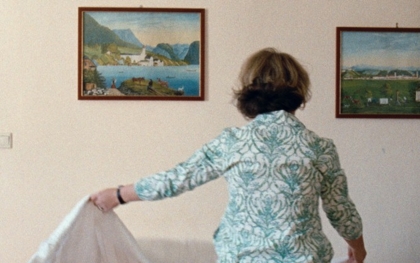
What Is Love
Geoff Andrew, 12 February
Had Nick James’ opening Berlinale blog post not imposed a ban on mentioning all things thermometrical, it would have been nice to report that the competition programme in this year’s festival was hotting up.
Not that this attendee, halfway through the first Sunday, has encountered anything in that main strand that’s especially brilliant: not even Captive, an account of a real-life 2001 hostage crisis set in the jungles of the Philippines, directed by Brillante Mendoza. While a solid-enough recreation of events (marred only by a few problems of pacing), the film never generates quite enough tension to succeed as a genre piece; nor does it allow enough space for Isabelle Huppert, playing a French missionary among the group held by Muslim kidnappers, to take it into more interesting non-generic areas. It’s eminently watchable, but not a lot more.
That’s what I’ve felt about most of the competition entries I’ve seen so far. Christian Petzold’s Barbara, about country doctors working in the GDR in the early 1980s, was rightly admired by many. It’s very well put together, and Nina Hoss’s central performance, as the medic hoping to escape to the West but already under close surveillance by the authorities, is very fine; but I personally found it a little too studied, a little too cool. (Sorry, Nick.)
The Taviani Brothers’ Caesar Must Die – in which a cast of prison inmates are shown rehearsing a loose stage adaptation of Shakespeare’s Julius Caesar – suffers if anything from the opposite: a few of the inmates are inclined, here and there, to over-emote. But it remains a powerful piece, for all its brevity and modesty; indeed, as a witty cautionary tale of failed political idealism, revolutionary communal action, cyclical Utopianism and liberation (or not!) through art, it sits firmly within the tradition upheld by the veteran Italians.
I won’t go into detail about Meteora – a Greek film about the love between a monk and a nun set in the famously spectacular titular gorges – except to say that its animated icons, its use of Pérotin et al on the soundtrack and its dingy, soft-focus digital Scope compositions all struck me as somehow a little phoney.
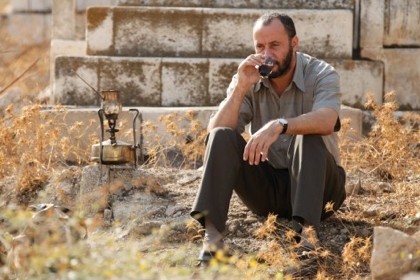
The Last Friday
But the finest finds for this writer have been away from the main competition, in the Forum section. Even there it’s been possible to find films of few if any discernible virtues (the Iranian Modest Reception and the Austrian Spain being conspicuous examples), but they’re more than compensated for by two small gems. The first, Yahya Alabdallah’s The Last Friday, was also, I have to confess, the first film I’ve ever seen which was produced by the Royal Film Commission of Jordan (complete with a crown logo on the credits).
Not that it’s any way a propaganda piece for life in Amman; indeed, its protagonist is a cab driver deep in debt, separated from his wife and son and facing a tricky hospital operation, and many of the characters are less than sympathetic. But Alabdallah really knows how to tell a story through imagery, editing and sound (there’s not much dialogue), keeping us intrigued by its mysteries as well as involved in its emotional dynamics. It’s bold, assured stuff.
Those qualities might have been expected, too, of a new film by the Austrian writer-director of the ambitious and rigorous Struggle, which played at the Cannes, London film festivals and elsewhere – except that that was back in 2003. We’ve had to wait nine years for Ruth Mader’s second feature, and I’m glad to say that it was worth it. What Is Love (no question mark!) consists of five short vignettes about the role played by love in the seemingly unremarkable, even banal lives of various Austrian provincials, and mixes documentary with a little fiction (though it’s impossible to tell how much) to wholly engrossing effect.
Amazingly (and bravely on Mader’s part), sex doesn’t really come into play at all; moreover, as it deals with a priest, a single woman, a workaholic building society agent, a factory worker and a forest-owning family of Christians, it never feels remotely invasive or condescending. Even though the film is often very funny, it is also entirely respectful, even tender in its sympathies. I adored it.
Starship stormtroopers: Iron Sky
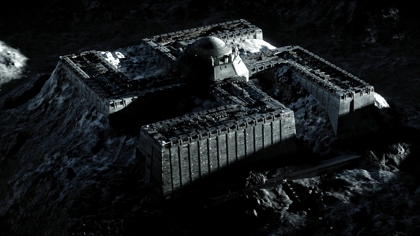
Demetrios Matheou, 12 February
Every film festival has its guilty pleasure. It used to be a film with delusions of artistic value, thus allowing critics to kid themselves; the historic Cannes screening of Vincent Gallo’s The Brown Bunny is the choicest example of that. These days no-one bothers to pretend. And as genuine as the anticipation has been here for new films from the Taviani Brothers, Miguel Gomes and Guy Maddin, the words on everyone’s lips in the shadows of grey Berlin have been “Iron Sky”.
Let’s face it, a film about Nazis from the Moon directed by a Finnish rock star, starring Udo Kier as a future Führer and with the tagline “The battle for the Earth is about to get Nazi”, is hard to resist. And the fact that we’re in Berlin, a city that not so long ago was still frozen in German Vergangenheitsbewältigung – the tongue-twisting struggle to come terms with its past – makes the festival’s inclusion of such teasing pulp all the more commendable.
So we’re led to believe that those Nazi rocketmeisters who after WWII joined the US space programme were merely the B-team, while the real geniuses facilitated the exodus of a Nazi community to the dark side of the Moon in 1945. In 2018 Hitler is long dead, but there’s a new Führer who plans to invade Earth.
Of course, the result doesn’t live up to the anticipation. Shaky plotting, acting light years beyond ham (as usual, Kier phones in – or should I say ‘beams in’? – his performance, only coming to life when yelling at a subordinate, “Ich heiße nicht Hitler!”), and a surprising scarcity of good jokes will deny it the status of cult classic.
But it certainly has its moments. I particularly enjoyed the idealistic school teacher, whose commitment to National Socialism derives from her abbreviated viewing of Chaplin’s The Great Dictator (“the greatest short ever made”). Once the Nazi comedy has worn thin there’s unexpected satire on Earth, where the president is a Sarah Palin clone seeking re-election, and pleased as punch at the prospect of war with “the only guys we ever managed to beat in a fair fight.”
Director Timo Vuorensola marshals some terrific special effects, as the Nazi’s über-spaceship Götterdämmerung goes head to head with the SSS George W Bush. There’s an impressive patina to the lunar base design, and a fetishistic Rocky Horror Picture Show thing going on with the clothing, the strutting and the final showdown in high heels.
What the film really lacks is Werner Herzog – or the version of him by my esteemed colleague Jonathan Romney currently doing the rounds of the Berlinale – inquiring periodically, “And are you prepared to meet your doooom?”
Distribute these!
Watching and workshopping
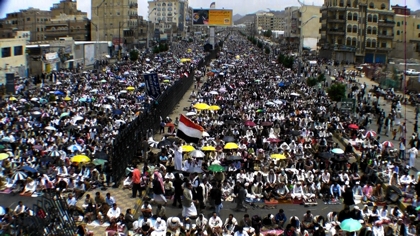
The Reluctant Revolutionary
Suzy Gillett, 10 February
This is my first Berlinale. I’ve been preparing for months, as I’m running a massive distribution and marketing workshop called Making Waves – this week is the calm before the storm. Twenty-five film students from Spain, France, Romania, Germany and the UK will be working (hopefully) together in five pan-European teams for the week, role-playing distribution companies and learning the nitty-gritty of working with independent film. It looks good on paper but how will it actually turn out?
Meanwhile, I’m also wondering how many films I can sneak off to see. I’ve got to catch Sean McAllister’s The Reluctant Revolutionary – he’s just got out of jail in Syria and is one of the UK’s most interesting documentary makers – as well as Roma director Tony Gatlif’s latest, Indignados, which sounds particularly in with the [Occupy-movement] zeitgeist. I’ve an appointment to catch up with Faouzi Bensaïdi and see his Death for Sale, which scored the Special Jury Prize at the Moroccan National Film Festival in Tangiers, and I’m very keen to watch the promising Aujourd’hui by talented Franco-Senegalese filmmaker Alain Gomis… and all that’s just on Saturday! I’ve also pencilled in the archive screening of Shirley Clarke’s rarely seen 1961 film The Connection.
My gang arrives on Sunday; for bonding purposes I’ve booked us all into a hostel, workshop trainers and students alike (so they need to remember their towels). Then we all have to see our case study films. For the best part of this month I’ve been cajoling (with help from colleagues in partnering film schools) International Sales Agents to let us have precious new films in the Berlinale to work on – during the week our band of 25 will be creating posters, trailers and distribution strategies using real film materials.
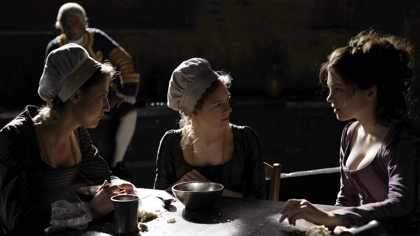
Farewell, My Queen
We’ve scored some beauties: we were incredibly lucky to get the festival’s opening film, Benoît Jacquot’s Farewell, My Queen (Les adieux à la Reine), a sumptuous costume drama that I hope is properly republican in tone; then, thanks to the Co-production Office – which always has the jewels of arthouse cinema on its books – we’ll be working on the completely beguiling, in-competition Greek film Meteora by Spiros Stathoulopoulos, the love story of a monk and a nun who live in retreats atop facing rock pillars.
Another film in competition is Antonio Chavarrías’ Spanish work Childish Games (Dictado) – it will be great to see what the students come up with for it. The fourth case study (which is showing in the European Film Market) is The Phantom Father by Lucian Georgescu, senior lecturer at the Romanian Film School (whence all those incredible directors), which is a road movie through my favourite landscape, Transylvania.
The fifth, Reported Missing (Die Vermissten), is the first feature by two graduates of the dffb, the amazing state-of-the-art Berlin film school that is playing host to our workshop and many of the European Film Market screenings. The graduation film of producer Sol Bondy and director Jan Speckenbach was totally brilliant, so my hopes are high for this one.
While this whirlwind of a week is hard to conceive of, I’m looking forward to sharing the discovery of another batch of new films in the company of such promising talent. And if all goes to plan, maybe they’ll let me sneak off to catch Harun Farocki’s latest…
The grim Werner: Herzog does Death Row
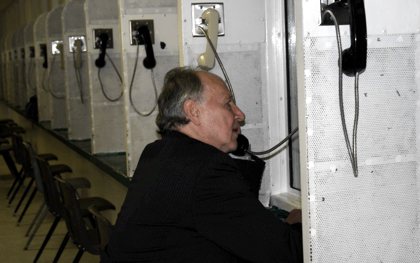
Death Row
Jonathan Romney, 10 February
The prospect couldn’t be bleaker – you arrive in Berlin on a frosty February evening, dash to pick up your accreditation, then spend your first night in town watching a three-hour Werner Herzog documentary about American prisoners condemned to death. I’d already been cracking the expected jokes about what a Herzog doc called Death Row might hold – and then, sure enough, it’s not long before those sepulchral Bavarian tones are asking a convict, “How do you feel about your impending fate?” Herzog certainly couldn’t be accused of excessive diplomacy, even to a man who’s looking his own death in the face: he even starts one interview by telling a convicted murderer that just because he’s interested in his case, “It does not necessarily mean I have to like you.”
A four-part TV project for Channel 4, Death Row is a pretty substantial prospect, and a different undertaking from Into the Abyss, Herzog’s documentary on the same theme, to be released in the UK next month. This one deals with four different cases – presented as four ‘portraits’ of five different prisoners, although in fact the film oscillates unevenly between character profiles and what you’d have to classify as ‘true crime’ case histories, bolstered with testimonies from family members, detectives, attorneys et al.
The four films, running approximately 45 minutes each, are at their most riveting when Herzog restrains his usual interviewing eccentricities (which he pretty much does) and allows his subjects to tell their stories. One man, Floridan killer and arsonist James Barnes, is at once the film’s most unsettling and most familiar figure – a calm, lucid, shaven-headed man, and you have to blink to remind yourself that he’s not being played by Pruitt Taylor Vince. It’s the testimony of his sister Jeannice, herself with a chequered criminal past, that offers one of the most disturbing insights, with intimations of a shared nightmare past and possibly repressed memories of sexual abuse.
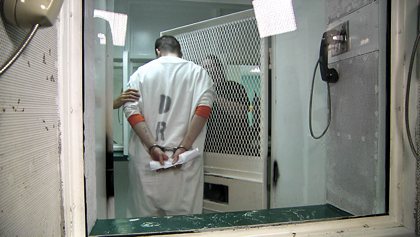
We never quite know how much to believe of what the prisoners tell us; with little else to do while awaiting death, it would seem only normal that some degree of fabulation would keep people sane. An ebullient Texan named Hank Skinner – something of a natural comic – protests his innocence, and tells an extraordinary story about a last-minute reprieve from lethal injection, just when he’d already started tucking into his final meal (a more than copious blow-out that could only be Texan). And a British woman named Linda Carty is the focus of a truly distressing horror story about the kidnapping and murder of a Mexican woman: Carty, a mercurial performer first seen giving a flamboyant performance of ‘Amazing Grace’, is the most elusive, unknowable figure here. For sheer narrative power, though, there’s no beating the charismatic George Rivas, a jailbreak maestro whose adventures you wouldn’t credit if Herzog decided to spin them into a fiction feature (and I wouldn’t be at all surprised if he did); as recounted here by Rivas and fellow condemned man Joseph Garcia, they’re riveting.
I haven’t seen Into the Abyss yet, so I couldn’t say how the films compare in offering a picture of life in extremis, or in what they reveal about the death sentence in general (Herzog announces flatly at the start that he’s against it, but doesn’t belabour the point). Death Row is certainly never less than compelling in what it shows of American life at its most brutally disadvantaged – while the way that successive life sentences have cascaded down on Rivas’s head says a lot about the more flamboyant absurdities of American law.
But Herzog’s interviewing process doesn’t entirely emerge with flying colours: much of the time, he seems to be making it up as he goes along, asks some outrageously leading questions, and can be flippant or even tabloid-y – asking one felon how he felt about a dead police officer’s son “waiting for Daddy to come home.” Herzog is never seen, but the camera holds on his interviewees, who for the most part are unflappable, dignified, candid (as far as we can tell) and, in one case, even versed in their interviewer’s own history. “You know that movie Werner Herzog Eats His Shoe?” says Skinner. “Well, that’s what the food is like here.”
Introduction: I am just going outside…
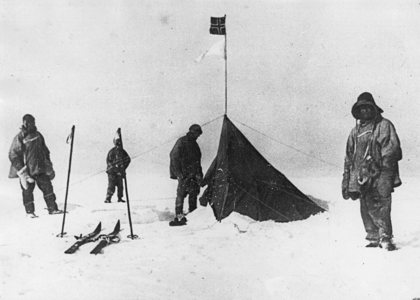
S&S’s blog team gear up
Nick James, 9 February
Welcome to our rolling commentary on the 2012 Berlinale film festival. I’m writing this in London after a trip to M&S and Uniqlo for extra thermals, having heard that Berlin’s weather prospect is of –16℃ at night. I arrive there (I hope) tomorrow, and want to discourage in these entries an ongoing theme of how cold it will be by getting my blow in first. What warms me is the thought that this year’s is somewhat of a mystery Berlinale. Beyond a handful of obvious attractions, it’s hard to determine in advance what kind of festival we’re going to get.
As usual UK audiences will already be familiar with some of Berlin’s headline films, such as Steven Soderbergh’s Haywire, Jason Reitman’s Young Adult and Phiyllida Lloyd’s The Iron Lady. Alongside these we have the obvious public interest in the Angelina Jolie-directed, Serbian-set Balkan war drama In the Land of Blood and Honey, and in the very title of Billy Bob Thornton’s Sundance attraction Jayne Mansfield’s Car. To these you might get immediate attention for Kevin Macdonald’s Marley, his biopic of the reggae legend Bob Marley, and maybe Side By Side, the documentary in which Keanu Reeves interviews all sorts of film folks about the effects and successes of digital tech.
At the level of our own core readership there will be excitement about Guy Maddin’s new haunted house movie Keyhole, the return of the Taviani brothers with Caesar Must Die (about a prison production of Shakespeare’s Julius Caesar), Brillante Mendoza’s portrayal of kidnapped tourists and missionaries Captive, Christian Petzold’s new cold war portrait Barbara, Tsui Hark’s Flying Swords at Dragon Gate (which I hope does what we expect it to), and the full complement of Werner Herzog’s Death Row films (which Jonathan Romney should be seeing as I write this). As well as these, the film I’m most excited about is Miguel Gomes’s Tabu, which I’ll leave, for the moment, unforetold.
Yet these semi-known quantities are not the only thing that fuels one through the sub-zero streets. (Whoops, sorry.) I always give myself quick reference notes for those films about which I know nothing beyond the press notes. Phrases like “self-reflexive about Filipino film clichés” or “sounds like Le Havre meets Cape Fear” are designed to entice one into the unknown. Let’s hope some lead to real discoveries this year.
